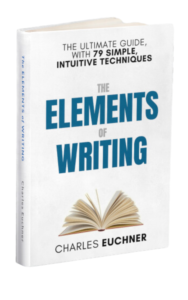The Rio Mamoré, which runs through Brazil and Bolivia, meanders more than any other river in the world.
NASA’s Earth Observatory explains: “The greater the amount of sediment from external sources (glacial, volcanic, or human activity), the more likely the river was to meander; rivers and streams with lower sediment loads wandered less. Those high-sediment rivers also saw more cutoff events, where crescent-shaped oxbow lakes are for.”
There’s a lesson here for writers: To prevent your sentences and paragraphs from meandering, avoid filling them with unnecessary sediments.
Avoid using too many modifiers, which divert the prose from its main point. Instead, try to compose sentences that make a point simply. Make connections between ideas. But avoid making connections that connect with connections with connections.
Consider the following passage from The New York Times, in an article about Judge Tanya Chutkin’s “no-nonsense” handing of the case against Donald Trump for his involvement in the January 6 insurrection:
After watching from the sidelines for nearly eight months as Mr. Trump’s lawyers fought their way up to the Supreme Court with what turned out to be a largely successful argument that he had broad immunity from prosecution on charges arising from his official acts as president, Judge Chutkan moved quickly to get pretrial proceedings moving again.
This 57-word sentence requires too much work to follow. Let’s break down its component parts:
-
- After watching from the sidelines for nearly eight months
- as Mr. Trump’s lawyers fought their way up to the Supreme Court
- with what turned out to be a largely successful argument
- that he had broad immunity from prosecution
- on charges arising from his official acts as president,
- Judge Chutkan moved quickly
- to get pretrial proceedings moving again.
Almost always, reporters and editors should break up a sentence like this. Here’s how a clearer might read:
Judge Chutkin paused the case for nearly eight months as Mr. Trump’s lawyers challenged Smith’s authority to make the charges. In a controversial decision, the Supreme Court agreed Mr. Trump had broad immunity from charges arising from his official acts as president. After the decision, Judge Chutkan moved quickly to resume pretrial proceedings.
This 53-word passage is easier to follow because three separate ideas are presented in three separate sentences. Each sentence offers a short and simple statement.
Here’s another Rio Mamoré passage:
In all of this, she distinguished herself from a colleague in Florida, Judge Aileen M. Cannon, who recently threw out Mr. Trump’s other federal case — in which he stood accused of mishandling classified documents — on the grounds that Jack Smith, the special counsel who filed both prosecutions, had been improperly appointed to his job.
This 54-word sentence begins with Chutkin, twists to Alieen Cannon, then twists to the case Cannon oversaw, then twists to special prosecutor Jack Smith, then twists to the charge that Smith was improperly appointed.
The sentence uses commas and em-dashes to create these twists. It’s hard to track the ideas–specifically, what is modifying what.
How might the Times reporter have done better? Try this:
Judge Chutkin’s response contrasts sharply with Judge Aileen M. Cannon, who oversaw the case in which Mr. Trump was accused of mishandling classified documents. After a series of long delays, Judge Cannon tossed that case. She argued that Jack Smith, the special counsel who filed both prosecutions, was improperly appointed to his job.
The new version is still 53 words. But broken into three sentences, it’s easier to follow.
Hey, I understand that the Times reporter was writing on deadline. When you rush, that kind of meandering often results. Still, it’s the job of the writer and editor to take an extra minute or two to make ideas as clear as possible.
In this important article, The Times let too much sediment into the flow of ideas. The result was a piece that meandered like the Rio Mamoré.


